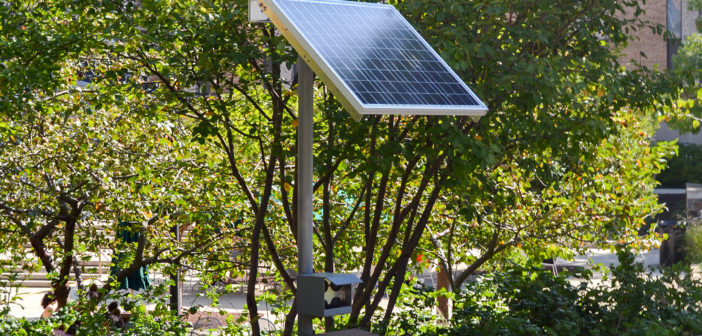On December 3rd, the solar energy partnership between Lehigh University, Lafayette College, Muhlenberg College, and Dickinson College, designed to cut 100 percent of greenhouse gas emissions from electricity, won them the 2020 Campus Sustainability Achievement Award.
The partnership came about through the four institutions’ mutual interest to invest in large-scale renewable energy projects to offset nearly 100 percent of their electric emissions. The project involves adding more renewable energy to the grid through a solar farm.
Lafayette’s Sustainability Director Delicia Nahman explained that Lehigh, Lafayette and Muhlenberg were talking to the same renewable energy consultant about renewable energy strategies at roughly the same time in 2018.
With the knowledge that other schools were interested in also pursuing a renewable energy contract, Lehigh’s sustainability team proposed hiring a consultant to collectively investigate a renewable energy strategy that would help achieve a lower megawatt price.
“Collectively recognizing the ability to add new clean energy to the grid is really powerful,” Nahman said.
Nahman said there were initially 17 colleges interested in joining a solar partnership, but it was eventually narrowed to local partners Lafayette, Dickinson and Muhlenberg.
“For Dickinson to try and invest in a project like this on our own, we’re not going to get the same financial benefit from it as when four colleges go into it together,” said Ken Shultes, Dickinson’s associate vice president for Sustainability and Facilities Planning.
The four schools signed off on a 15-year agreement in February to invest in the building and usage of a solar energy farm in Texas.
“Our hope going into this was that we would find a local renewable energy project, but after careful analysis we found that the environmental benefits are higher with the selected project in Texas,” Shultes said. “We learned that local projects would impact land that is currently forested or used for agriculture or that had that potential, whereas the land in Texas is essentially barren.”
About 45.9 megawatts will be generated from the solar project, which will fully cover all four of the colleges’ electricity needs.
“We are expecting in January 2021 they’ll have construction notice to proceed and commercial operation will be in December 2022,” said Katharine Targett Gross, Lehigh’s sustainability officer.
Lehigh University Architect Brent Stringfellow said the sustainability effort will make a tangible difference on the college campuses. He said having access to this energy farm will provide more renewable energy and replace the use of fossil fuels in operations.
“You can either get 300 calories worth of fruits or of ice cream,” Stringfellow said, comparing renewable energy to fruit and fossil fuels to ice cream to demonstrate that renewable energy is the more sustainable option.
At the moment, 47 percent of Lehigh’s greenhouse gas emissions are from purchased electricity, Targett Gross said. She said the partnership will offset 90 percent of that 47 percent.
To account for the remaining 10 percent, a smaller, more local solar farm will be built on Goodman Campus to provide even more renewable energy to the university, Stringfellow said.
Likewise, Lafayette has a contract for an on-campus solar plan.
“With energy from the contract with the consortium and from the contract for on-campus, 100 percent of electricity will be covered by purchased renewable energy,” Nahman said.
In addition to the colleges expanding renewable energy, they also expect a neutral or positive monetary return on investment, although that can’t be guaranteed.
“Colleges will make money if the market price for electricity goes up. You would expect it to (go up) because the price of electricity is at a historical low,” Shultes said.
Furthermore, Targett Gross, Shultes and Nahman said students at the different colleges will potentially be able to get internships through this project.
The colleges were overall enthusiastic that the project had the potential to culminate in an award, and they are now overjoyed that they have won.
“Lehigh is thrilled to join our partner schools in accepting this AASHE award. We are proud of the recognition that this collaborative project has received. This effort is a great example of the effectiveness of joining forces with other institutions to multiply the effect of our sustainability efforts to achieve both environmental and operational goals,” said Targett Gross.
Muhlenberg College could not be reached for comment.






Comment policy
Comments posted to The Brown and White website are reviewed by a moderator before being approved. Incendiary speech or harassing language, including comments targeted at individuals, may be deemed unacceptable and not published. Spam and other soliciting will also be declined.
The Brown and White also reserves the right to not publish entirely anonymous comments.